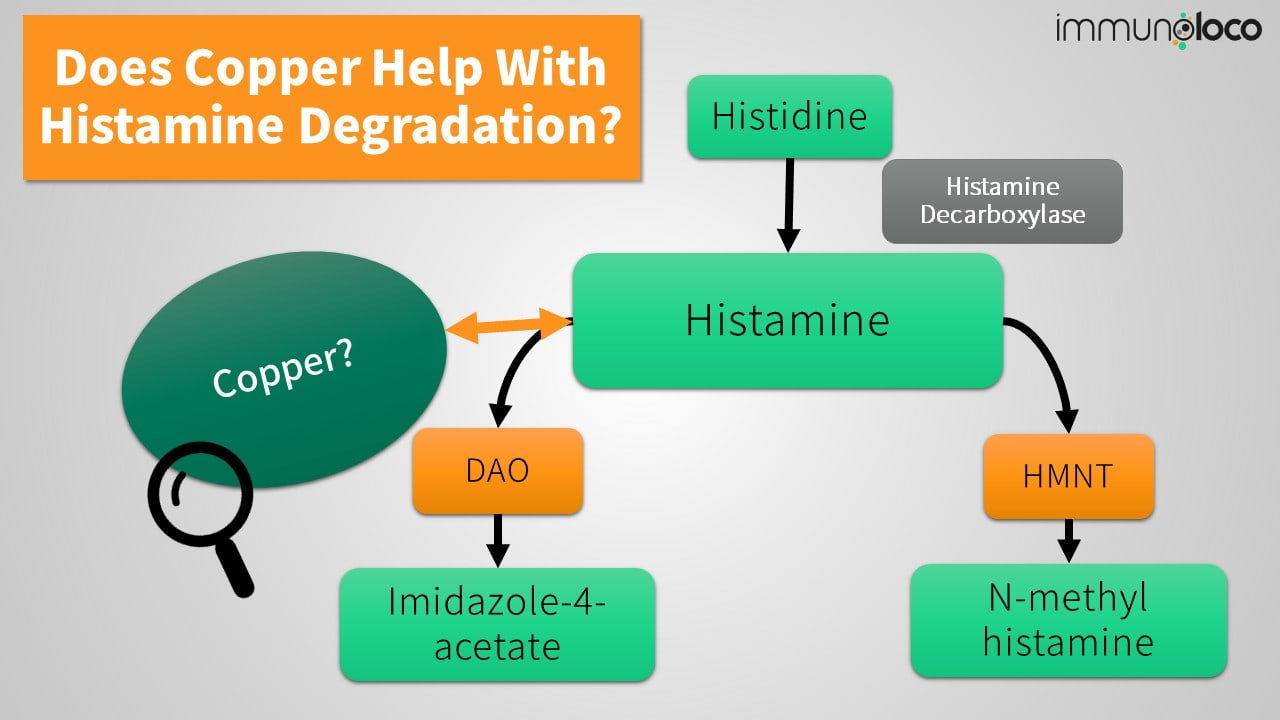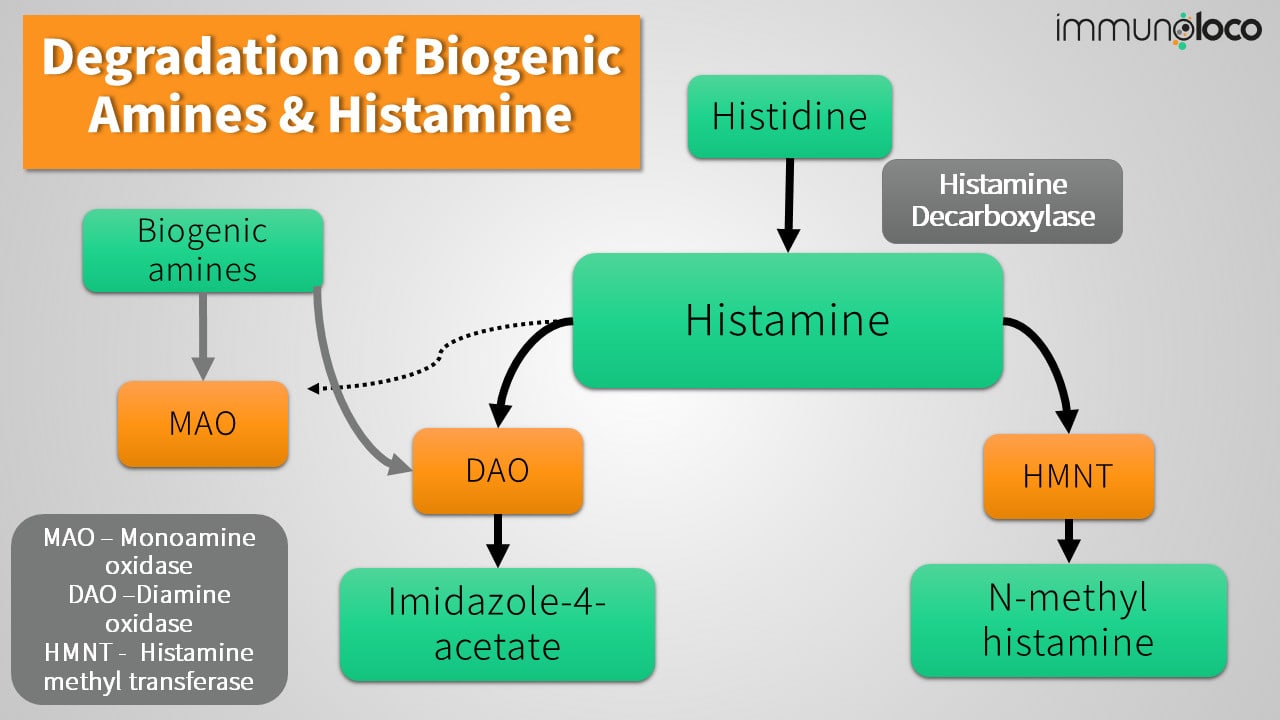
Some food supplements for histamine-intolerant or histamine-sensitive patients contain copper, claiming to support the enzyme diamine oxidase (DAO for short). Diamine oxidase is an enzyme that is mainly found in the intestine, where it breaks down histamine and thus contributes to the regulation of histamine levels in the body.
How Does Copper Affect Diamine Oxidase (DAO)?
A deficiency of copper appears in animal models to cause diamine oxidase activity or the level of diamine oxidase in blood plasma to be reduced.1,2 However, it is still questionable to what extent diamine oxidase activity in the blood provides insight into the activity of DAO in the intestine, where it is most abundant in the body and is essential for the histamine degradation process. I have not yet found any clinical studies on this for humans.
This article is about a health issue. It is important that you have your symptoms examined and treated by medical professionals. This article is not intended to be, and cannot be, a substitute for the care and advice of medical professionals that may be available to you.
Lack of Informative Value of DAO in the Blood (Serum/Plasma)?
Currently, it is still controversial how conclusive the level of diamine oxidase in the blood is. Some studies could not prove any significant DAO level differences between affected persons with histamine intolerance syndrome (HIS) and symptom-free persons who can eat histamine-rich foods.3
Therefore, the German Society for Allergy and Clinical Immunology (DGAKI) currently rejects blood diamine oxidase as a marker for histamine intolerance syndrome, or HIS for short.3 However, there are indeed medical experts who view this differently. For example, a constantly very low DAO level can also indicate a mutation in one of the DAO gene segments (see Causes of HIS).4
One reason for the partial lack of significance of the diamine oxidase value could be that it has not yet been conclusively clarified to what extent the DAO value in the blood is related to the actual diamine oxidase present in the intestine. It is mainly in the intestine that DAO is needed to break down the histamine produced from food.
For example, in pathology at the University Hospital Erlangen, the DAO present in the intestine can be classified by examining biopsies obtained during gastrointestinal endoscopy.
The DAO present in the intestine also appears to be negatively affected by inflammatory and allergic processes of the intestinal mucosa.5 Therefore, treatment of the causes that may lead to histamine intolerance is critical.
Unfortunately, because studies of diamine oxidase in intestinal tissue have not been performed as standard practice to date, valuable data that could benefit research on diamine oxidase deficiency are lacking.

Copper Deficiency
Copper deficiency can be responsible for various symptoms and occurs, among other things, when the diet is too one-sided or when there are absorption disorders. Causes that play a role, especially in children, are protein deficiency or severe diarrhea. These can also ensure that the intestine does not absorb enough copper.
In addition, a high intake of zinc can block copper absorption in the intestine.6 Patients with histamine intolerance often take supplements with zinc – so it is advisable to have both zinc and copper levels tested.
Should I Take Copper for Histamine Intolerance?
Due to the risk of getting side effects from too much copper or impairing zinc absorption, it is best to take copper only after laboratory determination or get it from food. The daily requirement is 1-1.5mg/day.7
Symptoms of Copper Deficiency
Bei einem Kupfermangel können folgende Symptome auftreten:
- Fatigue
- Anemia, fewer red blood cells, called erythrocytes
- Leukopenia, a reduction in white blood cells
- Osteoporosis
- Nerve damage
Treatment
In the case of a copper deficiency, the cause must be identified whether, for example, chronic inflammatory bowel disease is present that prevents the absorption of copper. Also, as mentioned above, a very unbalanced diet or artificial nutrition through the vein (so-called parenteral nutrition) can cause deficiency. one can remedy this by expanding the diet or a targeted supply through dietary supplements.8
In case of high oral zinc supplementation, one should make sure this is needed. If it is necessary to ensure normal zinc levels in the blood, one should take copper in addition. Care should be taken to ensure that copper and zinc are then supplemented separately – for example, zinc is taken in the morning, and copper is then taken in the evening.
Side-Effects of Copper Supplementation
Copper intake in case of deficiency is usually without side effects. People who are very sensitive may possibly experience minor gastrointestinal symptoms, such as mild nausea.
Care should be taken to ensure that there are no incompatible dyes or additives in the chosen form of copper supplementation.
Copper Poisoning?
Acute copper poisoning occurs after ingestion of more than 1 gram and can lead to death. Symptoms of copper poisoning include:
- Mucosal bleeding, vomiting blood
- Blue-green feces
- Gastrointestinal symptoms
- Strong feelings of thirst
- Headache
- Dizziness
- Epileptic seizures
- Jaundice
- Acute hemolysis (breakdown of red blood cells)9
Prolonged excessive intake can also lead to copper poisoning.
References
1. Legleiter LR, Spears JW. Plasma diamine oxidase: a biomarker of copper deficiency in the bovine. J Anim Sci. 2007;85(9):2198-2204. doi:10.2527/jas.2006-841
2. Kehoe CA, Faughnan MS, Gilmore WS, Coulter JS, Howard AN, Strain JJ. Plasma diamine oxidase activity is greater in copper-adequate than copper-marginal or copper-deficient rats. J Nutr. 2000;130(1):30-33. doi:10.1093/jn/130.1.30
3. Reese I, Ballmer-Weber B, Beyer K, et al. German guideline for the management of adverse reactions to ingested histamine: Guideline of the German Society for Allergology and Clinical Immunology (DGAKI), the German Society for Pediatric Allergology and Environmental Medicine (GPA), the German Association of Allergologists (AeDA), and the Swiss Society for Allergology and Immunology (SGAI). Allergo J Int. 2017;26(2):72-79. doi:10.1007/s40629-017-0011-5
4. Histaminintoleranz: IMD Institut für medizinische Diagnostik, Labor. Accessed February 17, 2019. https://www.imd-berlin.de/spezielle-kompetenzen/nahrungsmittelunvertraeglichkeiten/histaminintoleranz.html
5. Raithel M, Küfner M, Ulrich P, Hahn EG. The involvement of the histamine degradation pathway by diamine oxidase in manifest gastrointestinal allergies. Inflamm Res. 1999;48 Suppl 1:S75-76. doi:10.1007/s000110050414
6. Brzozowska A. [Interaction of iron, zinc and copper in the body of animals and humans]. Rocz Panstw Zakl Hig. 1989;40(4-6):302-312.
7. Wazir SM, Ghobrial I. Copper deficiency, a new triad: anemia, leucopenia, and myeloneuropathy. J Community Hosp Intern Med Perspect. 2017;7(4):265-268. doi:10.1080/20009666.2017.1351289
8. Water NRC (US) C on C in D. Health Effects of Excess Copper. National Academies Press (US); 2000. Accessed August 1, 2021. https://www.ncbi.nlm.nih.gov/books/NBK225400/
Heilpraktikerin in eigener Praxis, Hypnosetherapeutin, Besitzerin eines verrückten Immunsystems mit autoimmunen Spezialeffekten, die sie nach ihrem Studium mit ebensolcher Hingabe medizinische anstatt wirtschaftswissenschaftlicher Abhandlungen wälzen lassen. Wenn ihre Gelenke und Mastzellen es zulassen: begeisterte Heimwerkerin
Immunoloco unterstützen
immunoloco möchte Betroffenen kostenlos gute und hilfreiche Informationen rund um ein verrücktes Immunsystem bieten. Du findest das gut? Dann unterstütze immunoloco und meine Arbeit doch gerne. Jeder Euro zählt und hilft, das Projekt weiterleben zu lassen.

Also those with pyroluria should never take copper as a supplement. I check my levels every 6 mths, serum copper and plasma zinc to make sure they are balanced. I have to take a lot of zinc (90 mg) to make up for the loss due to kryptopyrroles. I think most people should only eat copper rich foods or food- like supplements versus taking a copper supplement. It can be very dangerous and can cause side effects. Unless there is truly a documented copper deficiency as you mention by lab test and a medical diagnosis. Menkes is apparently a rare genetic disease and the babies rarely live very long. I know a family that has an infant with this and he gets multiple daily shots of copper. It is an experimental treatment and so far he is doing okay.
Thanks for your comment, Dana!